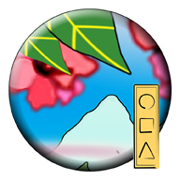On The Way: The Daily Zen Journal
Sermon in Tavatimsa Heaven
The Buddha
The World-Honored One said to queen mother, “Queen mother, the reasons why people cannot free themselves from illusion are greed, anger, and ignorance. Because of these three poisons, they cannot even be reborn in the heavens. How much less when they attempt to leave the realm of birth and death!
“In this world they lose their reputations, they are shunned by their friends and relatives like clods of dirt, and at the time of death they are beset by fear. They lose control of their minds and leave only deep regrets because of these poisons.

“Therefore, if one seeks the other shore of enlightenment, which is release from these bonds, one must cut the roots of suffering. Just as a wild horse is bound by ropes, a foolish mortal being is bound by desires and cannot move. So you should truly perceive the mind and body that make up yourself. Then you can be released from the sufferings of birth, old age, sickness, death, and sorrow.
“This is what is meant by cutting the roots of suffering. Thus you can free yourself from delusion, from attachment, and from hatred.”
At this time a god named Candradeva appeared from amidst the multitude and arranged his robes, paid respect to the World-Honored One…and asked the Buddha, “World-Honored One, for one who wishes to follow the path, how is it possible to attain the highest wisdom and practice and reach the shore of enlightenment?”
The World-Honored One answered saying, “O god, the bodhisattva knows that all things arise naturally, that all things are originally pure and without self, that all things are not born, neither do they exist without change, nor do they come into existence. Therefore when there is talk about the teachings of the Buddha there is no thought of self, nor is there attachment to things.
“Again, O god, all things are like the sky. Because all things of the three worlds are products of the mind, if there is no attachment on the part of the mind, there should be neither matter nor form. Again, this mind is something we cannot see. It is neither matter nor form; it is like an apparition.

“If one tries to find things based on such a mind, none of these things will be attained. Further, if you seek the mind, there is no such mind; there will only be a temporary name without substance. In truth, we know that there exists tranquility, free from attachment to desire.
Again, O god, a bodhisattva, in order to strengthen vows, and to attain perfect wisdom, incessantly strives with diligence and without rest. Always with compassion for others, a bodhisattva endures all suffering and does not change his/her resolve.
“Next, bodhisattvas, without breaking with the path of the common people, prepare for the path of the Buddha. In other words, they do not slander the way of the common people; and they do not especially consider the benefits of the Buddha’s way; neither do they try to praise the works of the Buddha.
“This is because they do not discriminate between the way of the common people as gross and vulgar and the way of the Buddha as noble and subtle. In truth, why should these two ways be differentiated? Actually they are not different; they only possess temporary names or labels. It is only discrimination that causes differences.

“Therefore, the Buddha’s doctrine is none other than discerning things as they are with wisdom. If we see all things with this wisdom, there is only Emptiness. This does not mean that things do not exist. They exist, but they possess no determined substance that we can become attached to. Thus they are called Emptiness. The discriminatory forms of the common people’s blind attachment arise because of ignorance.
“That is why, O god, things are different from what the common people see; they are not soiled by desire, are not discriminatory, and are absolutely equal. To see things with non-discrimination is the path of the Buddha.
“In fact, if one practices and follows the true teachings, not even one thing is separate from the Buddha’s doctrine. Things become discriminated because of the habits of the common people; if those habits are discarded, things, which are freed from language and thinking, will absolutely have no definite form. O god, although there may be no limit to the number of things, they are all part of the Buddha-Dharma. To know that all things in themselves are all Buddha-Dharma is the wisdom of the Buddha.”
Candradeva asked the Buddha, “World-Honored One, the bodhisattvas with their wisdom know the nature of birth and death, and they seek the path without any rest. How then do they regard the birth and destruction of things?”
The Buddha answered, “O god, the bodhisattvas see that all things are like phantoms, and that they manifest themselves as the six realms, but that in truth, there is neither birth nor death.”
The god asked, “World-Honored One, if your teachings are like this, then why did the World-Honored One come to this heaven and spend three months here for the sake of the mother who gave him birth? After all, the World-Honored One was born from Queen Maya, was he not?”
The World-Honored One said, “O god, the Buddha was not born from Queen Maya. The mother of the Buddha is the wisdom that enables one to reach the shore of enlightenment. In other words, she is the Perfection of Wisdom. The reason for this is that all the forms that are attributes of the Buddha, all the wisdom and power, were not due to Queen Maya; they were truly born because of the attainment of the Perfection of Wisdom.”
And Queen Maya and all the people received the teachings of the World-Honored One and rejoiced in their hearts.
The Buddha
Excerpted from Buddha Dharma – The Way to Enlightenment -Numata Center for Buddhist Translation 2003





In this relatively short piece, the Buddha spells out the beginning and end of training. It starts out fairly simple to understand, the root of our problem is our indulgence in anger, greed, and ignorance/delusion.
That much we have heard, and then to end suffering, we just cut through our attachment to those three “poisons” as they are referred to. We can spend our entire lives dissolving this sense of what creates our attachment to self/ego, and it is a moment-by-moment process.
Then we get to the more advanced part which requires a stretching and lengthening and feeling our way into a place most of us have never been. Just because it is difficult to conceive does not mean we should just brush it off as if we are incapable of ever getting it.
Or we allow ourselves to check out, glaze over, sigh, throw up our hands, and bemoan that living without complete attachment and discrimination is just too far out for these times we live in now. Sometimes the language itself can create such a barrier.
However, what we don’t recognize is the times during each day when we do in fact experience non-attachment, the times between thoughts and feelings that naturally occur.
And what about the times in meditation when the stream of thoughts just stops…the times when spontaneity arises because there is no agenda about what to do next. Do we allow those episodes to well up on their own and let them Be for a while?
What about going out for a walk with no particular destination? Going out into your garden and listening to what the plants have to say; hearing a conversation and not getting caught up in reactive mind? Seeing our “selves” from Mt. Olympus with a sense of detached amusement. Feeling a sense in a healthy way of being no one special.
Instead of thinking that this experience of non-discrimination and deep non-attachment is too otherworldly for temporal existence, see if you can catch the times when it naturally comes to you.
There is a way to make this heavenly perspective very much down to earth.
Walking with you,
Elana, Scribe for Daily Zen